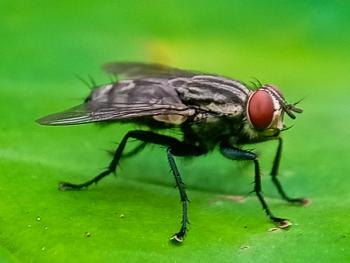
Banfield: Flea allergy dermatitis up 67% in cats, 13% in dogs in past 10 years
State of Pet Health Report highlights rise in prevalence that parallels increase in flea infestations in veterinary patients.
Over the past 10 years, Banfield has seen a significant increase in flea allergy cases. The best solution: administering parasite preventives year-round. (Image courtesy of Banfield Pet Hospital.)Banfield Pet Hospital's 2018 State of Pet Health Report, which focuses on skin allergies in pets, highlights a 67 increase in flea allergy dermatitis (FAD) cases diagnosed in cats at Banfield clinics since 2008 and a 12.5 percent rise in the disease in dogs, although experts note that overall prevalence is still fairly low.
According to Emi Saito, VMD, MSPH, MBA, Banfield's senior manager of veterinary research programs, FAD was diagnosed in 170 of every 10,000 cats seen at Banfield hospitals in 2017, up from 102 of every 10,000 cats seen in 2008. For dogs, FAD prevalence was 154 of every 10,000 dogs seen by Banfield in 2017, up from 137 in 2008.
So what's behind the ever-increasing number of FAD diagnoses in the past 10 years? Banfield investigators asked themselves the same question.
“We looked at changes in the prevalence of flea infestations in that same period as well,” Dr. Saito tells dvm360. “And we found that the increase in FAD nicely parallels the increased prevalence of fleas in dogs and cats.”
In other words, with more dogs and cats being infested with fleas, more are naturally being diagnosed with flea allergies as well. And while the increase in FAD might seem dramatic, especially for cats, Dr. Saito says notes that a close look at the numbers offers some perspective. “The condition in cats is relatively rare,” she says. “It's a small percentage affected, so any increase seems especially dramatic.”
Dr. Saito says researchers don't know for certain why the prevalence of fleas is increasing, but climate change could play a role. With the warmer temperatures, flea populations are surviving and thriving, and pets are spending more time outdoors where they can be infested.
“But also today more and more pets are being brought indoors,” Dr. Saito continues. “Fleas are happy to be inside where it's comfortable all the time. This is becoming a year-round problem-it's especially happening where people think fleas are a seasonal issue.”
Many owners who keep cats indoors don't use preventives year-round or even at all, Dr. Saito says. What they don't realize is that another animal-or even a human-can bring fleas inside. Plus, cats are fastidious groomers, and it can be hard for owners to spot a flea before the cat finds it herself. So the cat has flea bites but no fleas. “Oftentimes the first sign that a cat has been exposed is that allergic skin reaction [of FAD],” Dr. Saito says.
So, now what?
Let us help you fight the flea fight using our
The take-home message Banfield is emphasizing in this report is the necessity of keeping pets on flea preventive year-round-all dogs and cats in the household, whether they live indoors, outdoors or both. “Plus, owners and veterinarians need to be cognizant and aware, keeping an eye out for fleas, flea dirt or signs the pet is itching more,” Dr. Saito says.
Besides the FAD findings, Banfield's 2018 State of Pet Health Report found that 30 percent of food-allergic dogs and cats have another allergic skin condition. Food-allergic pets are also more prone to skin infections-dogs are six times more likely to develop a bacterial skin infection and cats are 15 times more likely, according to a Banfield release. For more information about the report, visit
Newsletter
From exam room tips to practice management insights, get trusted veterinary news delivered straight to your inbox—subscribe to dvm360.






